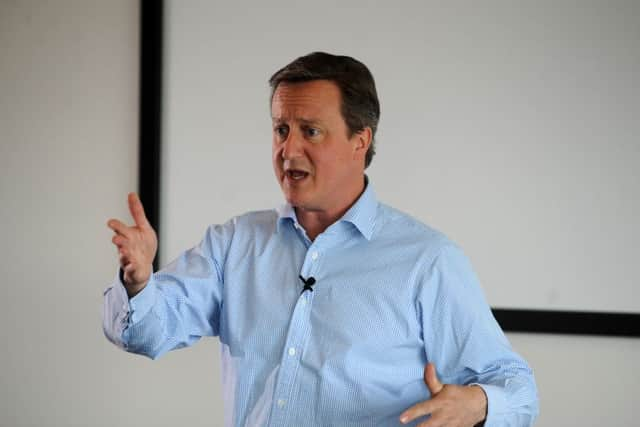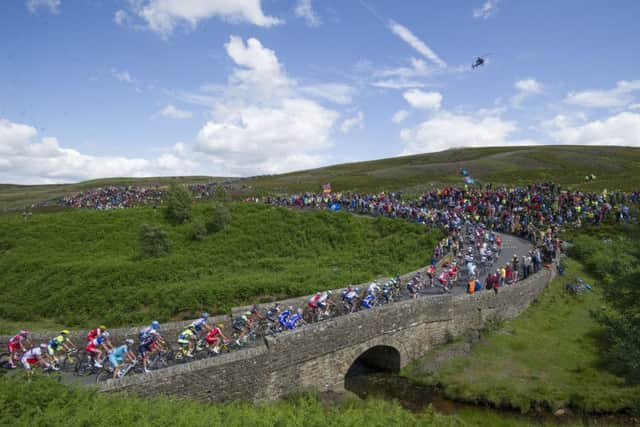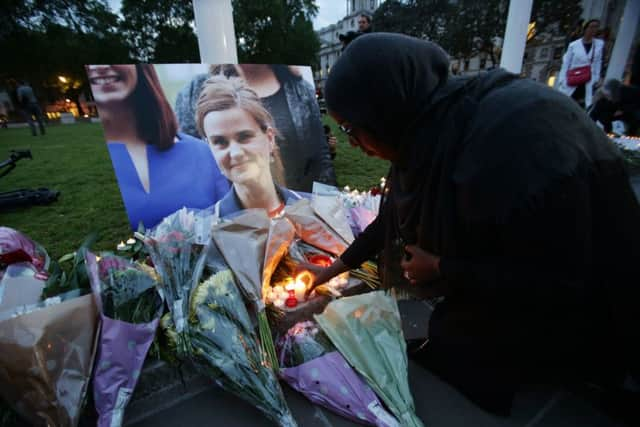Ten moments that defined Yorkshire’s decade (and one which didn’t happen)
1. CAMERON OFF-CAMERA
“We just thought people in Yorkshire hated everyone else, we didn’t realise they hated each other so much.” It was a remark never intended for public consumption but Prime Minister David Cameron was left with a red face after being caught on microphone making a joke about the region’s competing devolution proposals ahead of a speech in Leeds in September 2015.
Wakefield Council leader Peter Box admitted there was “some truth” in what Mr Cameron insisted was a light-hearted remark but Leeds Council leader Judith Blake took a more dim view of the Prime Minister’s comment, saying that the people of Yorkshire were “the friendliest in the world”.


Advertisement
Hide AdAdvertisement
Hide AdDespite the denials, it is fair to say the campaign for devolution has been a difficult process for Yorkshire in the years that have followed with the situation still unresolved for the region as other parts of the country reap the benefits of increased powers and investment.
Events reached a nadir in September 2017 after Barnsley and Doncaster Councils voted against plans to press ahead with a £30m-a-year South Yorkshire devolution deal in favour of pursuing a One Yorkshire model favoured by a majority of other local authorities in the region but not supported by the Government of the day, leading to an acrimonious row between Sheffield Council leader Julie Dore and Doncaster Council chief executive Jo Miller.
Sheffield City Region mayor Dan Jarvis, elected in early 2018, eventually helped to resolve the situation to some extent by May this year as an agreement was reached with the four South Yorkshire councils of Sheffield, Rotherham, Barnsley and Doncaster to finally start the stalled Sheffield City Region deal on the proviso that any authority wishing to leave and join a wider Yorkshire agreement will be able to do so after 2022.
With One Yorkshire still on the table but growing pressure to get other city region deals done as soon as possible, it is fair to say the topic of devolution and associated squabbles won’t be going away anytime soon.


2. YORKSHIRE’S GOLD RUSH
Advertisement
Hide AdAdvertisement
Hide AdLondon 2012 was one of the great highlights of the decade for the UK - thanks in no small part to the efforts of athletes from Yorkshire. Our sportsmen and women claimed a collective seven gold medals, two silver and three bronzes over the course of the home Olympic Games, a tally which would have put Yorkshire 12th in the medal table if it had been treated as an independent country.
There were many extraordinary moments during the Games but perhaps the one which best exemplified Yorkshire’s contribution to national celebrations was Jessica Ennis-Hill winning gold in the heptathlon in front of 80,000 people in the Olympic Stadium in what became known as ‘Super Saturday’. Her triumph was the first of three golds in 45 minutes for the British team as her success on the track was swiftly followed by Greg Rutherford in the long jump and Mo Farah in the 10,000m.


Other sporting successes throughout the decade including 66-1 outsider Auroras Encore, trained by Sue and Harvey Smith in blizzards on Baildon Moor, becoming the first Grand National winner from Yorkshire in 53 years in 2013.
England’s footballers reached the World Cup semi-final in 2018 with a team that had a strong Yorkshire core, including the likes of Harry Maguire, John Stones, Kyle Walker and Jamie Vardy. On the domestic front, Sheffield United fans have been delighted to see their side climb from the depths of League One to the upper reaches of the Premier League in three short years under the guidance of hometown hero Chris Wilder, while Leeds United supporters have made Argentinian Marcelo Biesla something of an adopted Yorkshireman after he has reinvigorated the club in recent years and put them on course for a long dreamt-of return to the top flight this season.
Advertisement
Hide AdAdvertisement
Hide AdAnother amazing sporting moment of the decade was provided at Headingley this summer by Ben Stokes as the all-rounder hit an extraordinary 135 not out against Australia to snatch victory from the jaws of defeat in front of a joyous home crowd.


3. HULL GOES BLUE
Hull’s incredible year as UK City of Culture in 2017 included many amazing highlights, but the moment which showed the city really meant business came in summer 2016. Over 3,000 volunteers stripped naked and were painted blue to pose for an art project called Sea of Hull by photographer Spencer Tunick in readiness for the year of celebrations.
Among those participating was The Yorkshire Post’s then features editor Sarah Freeman, who wrote after the event about how special it had been to participate in: “There were all shapes and sizes, young and old, tall and short, skinny and fat, but somehow we fitted together like pieces of a big blue jigsaw.”
Hull was far from the only place in the region to increase its cultural cachet in the last 10 years.
Advertisement
Hide AdAdvertisement
Hide AdThe Leeds First Direct Arena opened in July 2013, while a £16m redevelopment of the West Yorkshire Playhouse and a name change to Leeds Playhouse was completed this year. The £35m Hepworth Wakefield art museum opened in 2011, while the extraordinary restoration of the Piece Hall in Halifax to offer an open-air piazza filled with bars, restaurants, cafes and shops was finished in 2017.
The next decade also offers much promise for the region’s cultural scene given Channel 4’s impending move to Leeds.


4. CYCLING HITS THE HEIGHTS
Millions lined the streets as the Tour de France’s opening stage was held in Yorkshire in 2014 - with a combination of the massive crowds and stunning scenery leading race director Christian Prudhomme to describe the county’s Grand Depart as the “grandest” in the competition’s century-old history.
The success of the event was summed up as Buttertubs Pass in the Yorkshire Dales was transformed into the Cote de Buttertubs and an estimated 10,000 spectators crammed onto the narrow hillside road to cheer on the world’s best endurance riders.
Advertisement
Hide AdAdvertisement
Hide AdThe annual Tour de Yorkshire cycling race was set up as a result and Welcome to Yorkshire chief executive Gary Verity, who has instrumental in bringing the Tour de France to the region, received a knighthood. But feelings towards cycling in Yorkshire have somewhat soured this year, with Sir Gary resigning on health grounds from Welcome to Yorkshire amidst bullying and expenses allegations wile there was criticism in Harrogate over the damage done to the Stray parkland as a result of hosting a ‘fan zone’ for the UCI Road World Championships. However, nothing will take away from the memories of that glorious weekend in July 2014.
5. MURDER OF JO COX
One of the darkest days for the region in the last ten years fell on June 16, 2016, when Jo Cox, the Labour MP for Batley and Spen, was murdered by a far-right terrorist as she was on her way to a constituency surgery in Birstall in the run-up to the Brexit referendum.
Retired miner Bernard Carter Kenny, who was stabbed as he came to Cox’s aid, was subsequently awarded the George Medal for his bravery. Cox’s husband Brendan said on the day of her death: “Jo believed in a better world and she fought it for every day of her life with an energy and a zest for life that would exhaust most people. She would have wanted two things above all else to happen now, one that our precious children are bathed in love and two, that we all unite to fight against the hatred that killed her.”
Following her death, the Jo Cox Foundation organised ‘Great Get Together’ events designed to bring communities together and focusing on one of her core beliefs that she had set out in her maiden Parliamentary speech; “We are far more united and have far more in common than that which divides us.”
6. KELLINGLEY COLLIERY CLOSES
Advertisement
Hide AdAdvertisement
Hide AdThe closure of Kellingley Colliery - the last deep coal mine in Britain - in December 2015 brought down the curtain on what was once one of the country’s most successful industries. In 1900, more than one million people were employed at 3,000 collieries and by the time ‘Big K’ as it was known arrived in 1958, the tide was already turning to some extent with more machinery resulting in fewer jobs. Kellingley was originally hailed as a new generation of coal-mining and was the largest deep pit in Europe.
Even into the mid-1980s, there were more than 50 pits in operation in Yorkshire; 30 years later the lights went out for good at Kellingley. But as one door closes, others have opened. The Advanced Manufacturing Park in South Yorkshire, located on the former Orgreave site, has grown greatly in the last decade with new additions including specialist facilities for McLaren and Rolls-Royce.
7. TADCASTER BRIDGE COLLAPSES
There is barely a part of Yorkshire that has not been assailed by the misery of flooding in the past ten years but perhaps the most symbolic moment came with the collapse of Tadcaster Bridge on December 29, 2015, splitting the town in two and fracturing a gas main that resulted in the evacuation of hundreds of residents.
The initial response of the authorities left much to be desired, with the head of the Environment Agency Sir Philip Dilley on holiday in the Caribbean as thousands of homes in the North were flooded and Environment Secretary Liz Truss criticised over the imbalance in flood defence spending between Yorkshire and London. Repairing the bridge was made a “national priority” and it eventually reopened in February 2017.
8. DEVASTATING SCANDAL EXPOSED
Advertisement
Hide AdAdvertisement
Hide AdOn August 26, 2014, Professor Alexis Jay revealed the devastating findings of her inquiry into grooming gangs in Rotherham. “Our conservative estimate is that approximately 1,400 children were sexually exploited over the full inquiry period, from 1997 to 2013,” she said.
The report revealed that police had treated victims with “contempt” and there had been “blatant” failures from the council’s leadership, with senior managers underplaying the issue. It led to multiple resignations from council bosses and police and crime commissioner Shaun Wright, while eventual trials have brought many perpetrators to justice.
Criminal trials and investigations are still ongoing, as is a police watchdog inquiry into alleged cases of police corruption.
9. NORTHERN POWERHOUSE OFFICE MOVES TO LONDON
The so-called ‘Northern Powerhouse’ was one of Chancellor George Osborne’s most cherished ideas to rebalance the UK’s economy but eyebrows about the concept were frequently raised as austerity hit public services, local councils and transport in the North.
Advertisement
Hide AdAdvertisement
Hide AdThe apparent gap between what the Government was saying and what it was actually doing was exemplified in January 2016 when it was announced that its ‘Northern Powerhouse department’ - the one for Business, Innovation and Skills - was to shut down its Sheffield office and move 247 jobs to London. In July that year, it was announced the entire department was being disbanded through the creation of the newly-formed Department for Business, Energy and Industrial Strategy as Theresa May sought to distance herself from the Cameron and Osborne years.
10. KEN’S WITHERING ASSESSMENT
Yorkshire folk value straight-talking and one of the most famous examples of the last ten years came with Sir Ken Morrison’s public attack on Dalton Phillips, the chief executive of the supermarket that bore his family name.
Sir Ken told an annual shareholders meeting in June 2014 that he was distinctly unimpressed with Mr Phillips’ explanation for falling sales. “When I left work and started working as a hobby, I chose to raise cattle,” Sir Ken said. “I have something like 1,000 bullocks and, having listened to your presentation, Dalton, you‘ve got a lot more bull**** than me.”
Mr Phillips left his post six months later.
AND ONE THAT DIDN’T HAPPEN
One of the biggest business stories of the decade related to a planned deal that didn’t end up happening.
Advertisement
Hide AdAdvertisement
Hide AdA proposed merger between Leeds-based Asda and fellow supermarket giant Sainsbury’s was blocked this April by the UK’s competition watchdog over fears it would raise prices for consumers.
The proposed deal would have created the UK’s biggest supermarket chain and the firms had argued the move would have allowed them to reduce prices.
It blocking of the deal followed embarrassment for Sainsbury’s boss Mike Coupe who was caught on camera singing ‘We’re in the Money’, a song from musical 42nd Street, while waiting to be interviewed by ITV about the merger plan in May 2018.
After being filmed singing “We’re in the money, the sky is sunny, let’s lend it, spend it, send it rolling along”, Mr Coupe subsequently apologised for what he described as “an unfortunate choice of song” in the circumstances.
